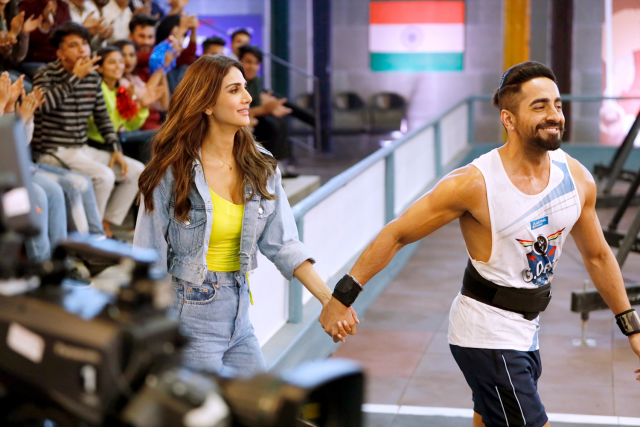Review: ‘Chandigarh Kare Aashiqui’ offers the same package wrapped in rainbow colours
Despite the film’s talk of fluidity, Ayushmann Khurrana's latest feels sterile and rigid

For an industry inundated with so much of the same, Abhishek Kapoor’s film Chandigarh Kare Aashiqui appears as though it would be a breath of fresh air, and, on that note, it does deliver from time to time. However, for a film with a subject matter of such immense depth and richness, it comes off as surprisingly hollow.
With actor Ayushmann Khurrana’s latest ‘social issue’ offering, Bollywood attempts to raise the banner of inclusivity via the love story of Manu and Maanvi, the former a manly-man bodybuilder with bulging muscles and a semi-shaved head, chugging protein shakes and lifting weights the equivalent of a baby elephant, and the latter a perfectly feminine Zumba instructor with a near-perfect blow-dry and microscopic waist to match.
Ticking all the traditional boxes of what it means to be stereotypically male and female, the only cause of conflict is that Maanvi is a transgender woman, and Manu, despite his macho, tough-guy persona, has unknowingly fallen in love with her. As he embarks on a journey towards accepting his feelings for Maanvi, in the process correcting his notions of what it means to be ‘normal’, Manu is hounded by his sisters far too preoccupied with his love life and supported by a set of twin best friends who have no real personalities of their own, serving only as reflections of the male lead.
The film also throws in a micro sub-plot that revolves around Manu’s widower father falling in love with a Muslim woman, much to his family’s disapproval. Peppered with references to Ghalib, sewaiyyan and biryani, rubab music swells in the background at the mere mention of the inter-faith relationship.
As an open display of his change of heart, Manu gives a speech on being ‘normal’, and how there may be no such thing. While meant to be an honest, heartfelt moment, the viewer can’t shake the creeping feeling of deception. This, perhaps, can be chalked down to two things. Firstly, Manu and Maanvi truly epitomise the traditional gender binary. Regardless of the fact that Maanvi identifies as a transgender woman, when it comes to traditional femininity, she could very well leave every other female character in the film in the dust. She is soft-spoken, demure, is positively brimming with grace, and her supermodel features only add to her perfection. Despite the film’s talk of fluidity, the character feels rigid.
This may be exacerbated if the viewer is aware of the fact that the actor playing Maanvi, Vaani Kapoor of Shuddh Desi Romance fame, is not, in fact, a trans woman. The reluctance of the filmmakers to cast a trans actor to play the character, instead choosing a cookie-cutter actor such as Kapoor to essay the role, feels disingenuous to say the very least.
Both Manu and Maanvi overtly subscribe to traditional gender roles, and the film’s aversion to any indigenous explanations of Maanvi’s gender and sexuality, steering clear of vernacular terminology, gives the film a sanitised, white-washed quality. Maanvi’s gender expression is acceptable because she can converse in fluent English and is part of the upper echelons of Indian society. Her social status and traditional good looks negate several of the obvious drawbacks that come with identifying as trans.
After the death of his mother, a young Manu copes with his grief by binging on food, which leads to weight gain and relentless fat-shaming by his friends and family. Sick of the heckling, he decides to become a bodybuilder, relying on protein supplements and strict dieting which, according to his own account, has detrimental effects on his health. In his speech on normality, Manu asserts that his toxic relationship with fitness also leaves him outside the realm of normalcy, implying that he sees himself as an outcast as well. The equating of Maanvi’s gender expression with his unhealthy lifestyle is enough to raise more than a few red flags.
Regardless of its shortcomings, the film is entertaining. However, the secret to its entertainment value is simple: Chandigarh Kare Aashiqui is as formulaic as a Bollywood film can get. Despite the out-of-the-box decision to employ a trans character, the film plays out the same way as every other Bollywood romantic dramedy on offer.
There is a sweetness to the film, but it lacks sincerity and conviction. The filmmakers skim the surface, being far too afraid to actually take a deep dive into the complex world of what it means to be multi-facetedly queer in a world increasingly hostile towards difference.
The audience knows exactly what is going to happen next every step of the way. The finale of the film is an amalgamation of all the different plot threads getting their sweet little happy endings without much effort exercised to get to that point. Friends are there for each other. Families reunite. Love wins. The same old narrative repackaged in rainbow-coloured wrapping paper and not much else.



















COMMENTS
Comments are moderated and generally will be posted if they are on-topic and not abusive.
For more information, please see our Comments FAQ